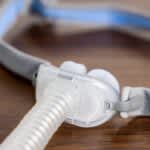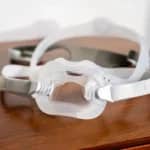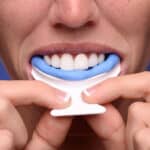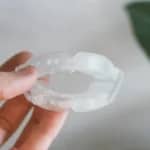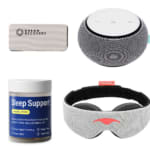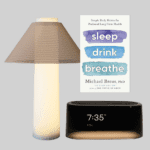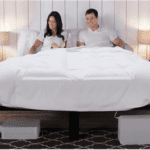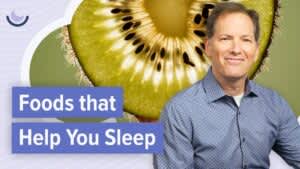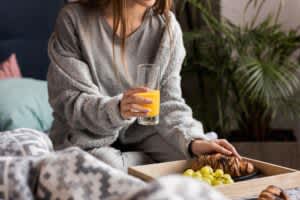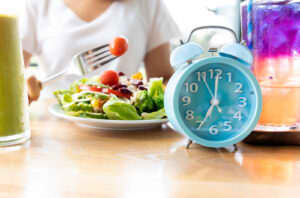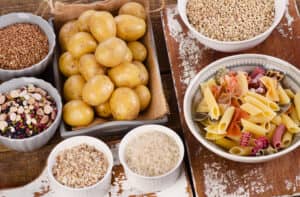We pay attention to our diet when it comes to our weight, but common bedtime food mistakes can also have a huge impact on your sleep quality. In fact, your diet could be a big reason you can’t sleep.
After years of studying sleep and its benefits, the phrase “you are what you eat” has grown on me. The fact is, what you eat plays a crucial role in determining your quality of sleep. But it’s not all about what you’re adding to your diet, but also when you’re eating.
Let me share with you five easy tips for optimizing your diet so you don’t have to suffer through more sleepless nights.
1. Add Melatonin Rich Food to Your Diet
Of course, we all know that fresh fruits and vegetables provide vital nutrients to help our bodies function at optimal levels. But did you know adding more fruit to your diet could also improve your sleep quality?
A number of fruits, such as cherries, oranges, bananas, pineapple, and grapes are naturally rich in melatonin, a vital hormone for regulating our sleep-wake cycles. In fact, melatonin helps with several facets of sleep. Research has shown melatonin may shorten the time it takes to fall asleep, while also lengthening REM sleep. That means, simply by adding melatonin rich food into your diet, you can improve your sleep quality, reduce daytime fatigue, and boost your energy levels.
If you’re not feeling fruit, whole grains like rolled oats, nuts, and seeds can also give you a natural melatonin boost.
2. Avoid Spicy Foods Before Bed
If you’re a big fan of spicy foods, you may want to consider when and how often you eat them to avoid harming your sleep quality.
Several studies have looked at the relationship between a diet high in spicy foods and sleep. The most famous example comes from Australia, where researchers had participants eat foods with Tabasco and mustard on some nights, followed by nights without spicy foods before bed. The results showed that on the night participants ate spicy meals there was a noticeable shift in their sleep patterns; not only did it take participants longer to fall asleep, but they also spent less time overall in deep sleep compared to nights without spicy meals. Researchers believe capsaicin, a compound found in spicy foods, could be a main culprit. Capsaicin is thought to raise body temperature, which interferes with comfortable sleep.
3. Limit Caffeine and Alcohol for Better Sleep
If you’re like me, you enjoy a good cup of coffee, but you probably also know it’s not the best for sleep. Caffeinated drinks like coffee are a stimulant meant to keep you wired and awake. That’s great for when you’re churning through morning meetings, but obviously less ideal when you’re trying to get some shut-eye.
Caffeine is a melatonin suppressant, which could cancel out the benefits of adding melatonin rich foods to your diet. Since caffeine has a long half-life of about 6-8 hours, I recommend having your last cup by 2:00 p.m.
While caffeine may seem like an obvious thing to cut in your diet, this one’s more surprising. Alcohol is the most popular sleep aid in the U.S., with about 20% of Americans having a drink to help them fall asleep each night. The problem is, alcohol may help you get to sleep, but it doesn’t help you get quality sleep.
Researchers at the University of Pennsylvania found a correlation between alcohol consumption and more frequent nighttime interruptions. Alcohol acts as a diuretic, which leads to more trips to the bathroom during the night. The consistent sleep interruptions brought on by alcohol use also make it harder for you to reach REM sleep, the important final stage of sleep that helps regulate mood and improve memory retention. This doesn’t mean you need to forgo alcohol altogether if you want to get good sleep, but it does mean you should limit your alcohol consumption a few hours before calling it a night.
4. Limit High-Fat Foods
Foods that are high in fat — including fast food burgers, margarine, and potato chips — taste good, but they also disrupt our sleep.
One study looked at rats on high-fat diets over the course of eight weeks. By the end, high-fat diets led to more time spent sleeping, but also more fragmented sleep. So not only did high-fat foods correspond with increased sluggishness, they also corresponded with less effective sleep.
5. Balance Is Key
As with most things in life, balance is key when it comes to your diet and sleep. You certainly don’t want to eat a full meal right before falling asleep; this can cause indigestion and heartburn. Optimally, give yourself about 3 hours, which is about how long it takes for your stomach to process food, before going to bed.
At the same time, you don’t want to feel starved at the end of the night. When you’re hungry, that’s when ghrelin, a metabolic hormone, kicks in. Several studies have found ghrelin is “significantly inversely associated with hours of sleep,” or, in other words, leads to shorter sleep duration. Ghrelin has also been shown to increase the odds you’ll wake up during the night — which explains why many of us sneak off for a midnight snack from time to time.
Dieting can be great for a lot of different situations and different people. But don’t let yourself go to bed with a rumbling stomach. It’ll only get in the way of you getting a great night of sleep!
References (4)
The Sleep Doctor Forum: Real Experiences, Real Connections
Continue the discussion on the Sleep Doctor Forum. Connect with experts and fellow forum members on CPAP, sleep apnea, and all things sleep. A priceless resource that’s free to join.



